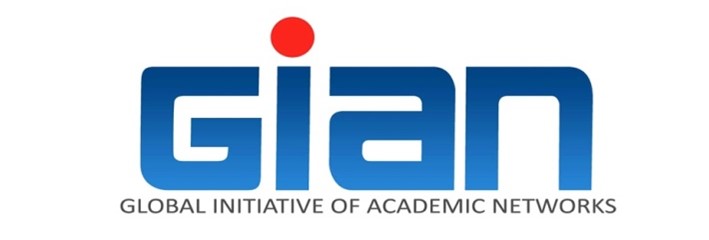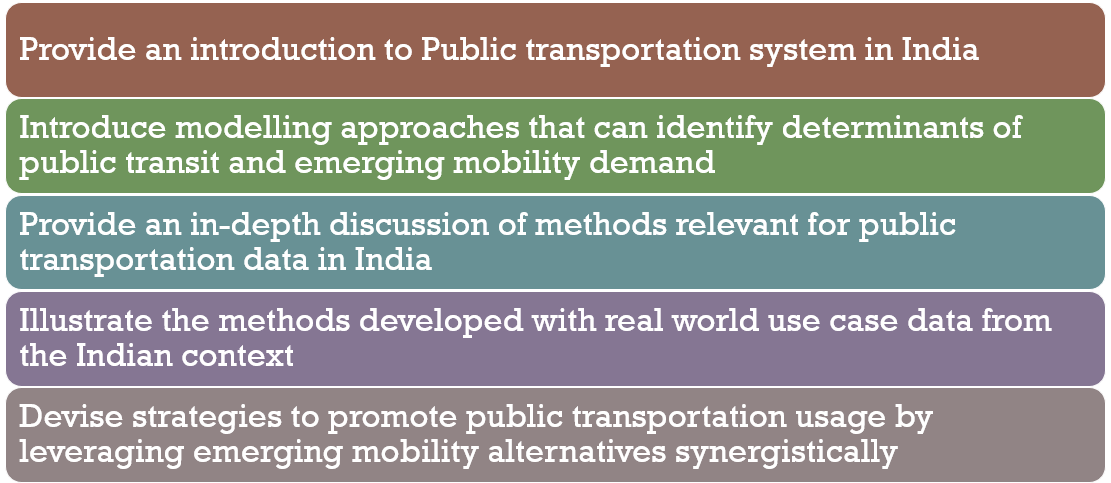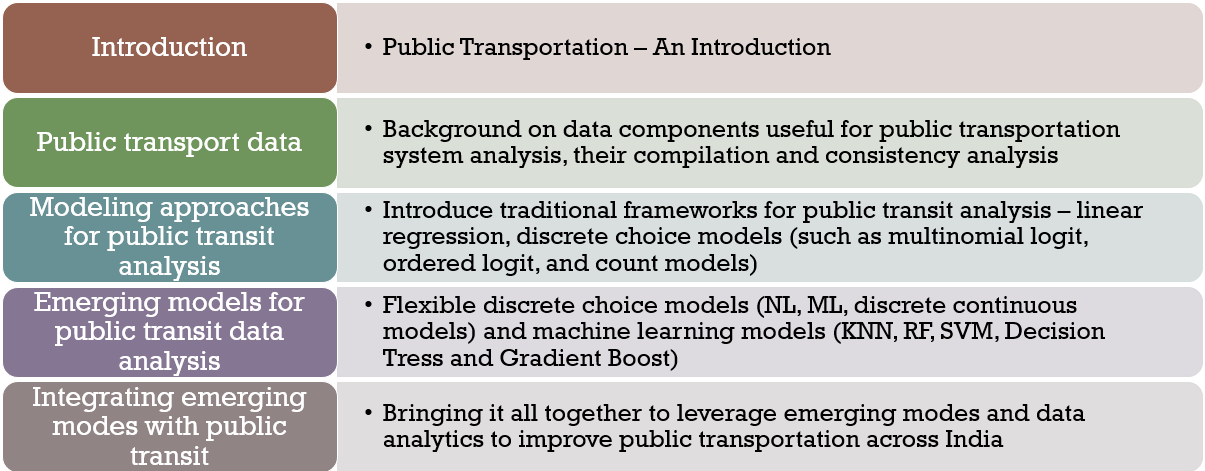
Bringing synergy across different transit modes in India by addressing
challenges for sustainable transport modes, Warangal, June 23-27, 2025
![]()
Course Overview
The significant increase in urbanization across India has contributed to rising demand for road transport and personalized modes of transport (cars and two-wheelers). The number of registered motor vehicles across India have significantly outpaced the growth of road network and public transit systems. It is observed that the vehicle population has grown three times faster than the road network, while there is a decline in the growth rate of transit systems (especially public transport in urban areas). Across the globe, there are significant transformational changes in the transportation system due to the emergence of various new mobility options (shared mobility and micromobility), technological advances improving existing public transportation systems (such as real-time arrival updates, boarding and alighting data collection) and India is no exception. These emerging mobility alternatives and technologies can contribute to improved transportation system sustainability by improving connectivity to existing public transportation systems and reducing reliance on private vehicles. To achieve these potential synergies across different non-private vehicle modes, there is a need to address different challenges in coordination across different platforms and comprehensive analytics to present useful strategies for improving system level synergies.
An important part of understanding the challenges with non-private vehicle travel in India is examining the current state of the transportation system. The current course proposal will focus on training the academic, public, and private professionals in India on providing technical knowhow in examining data from different non-private vehicle modes. The emphasis will be on different traditional public transit modes (such as bus, metro and rail) and emerging mobility options (such as rideshare (Ola and Uber) and micro-mobility modes). The course will leverage recent advances in modelling and system level analysis to provide case studies for course participants. The course will specifically focus on (a) advanced modelling approaches that can identify determinants of public transit and emerging mobility demand, (b) develop modelling approaches that allow for a quantitative impact analysis of modification or additions to public transportation infrastructure in the region, (c) develop frameworks to identify public transportation deserts in urban regions, (d) approaches that can understand potential complementarity or substitution between public transportation and emerging modes, (e) illustrate the methods developed with real world use case data from the Indian context and (f) devise strategies to promote public transportation usage by leveraging emerging mobility alternatives synergistically.
Course Objectives

Course Modules

Course Material
The lecture notes, codes employed in the class and any other supplementary material is available here for download. The material is organized by module.
Module 1: Introduction
[Lecture Slide Deck]
[Introduction Case Study]
Module 2:Public Transport Data
Module 3:Traditional Discrete Choice Models
Module 4:Advanced Analytical Models
Module 5:Bringing it All together
R Codes
The various codes that can be used for the different models discussed in the course are included below.
Please note that some of the codes are modified from Apollo Package in R for educational purposes. The user should carefully review the code and its results before using the files. We are not responsible for any errors. For more details refer to Hess, S. and Palma, D., 2019. Apollo: A flexible, powerful and customizable freeware package for choice model estimation and application. Journal of choice modelling, 32, p.100170
The data for linear regression model of ridership in India was provided by Prof. Abdul R Pinjari. The dataset only includes a partial sample of the data and should not be used for any analysis.
Statistical/Econometric Model Codes
[Linear Regression and India Data]
[Binary Logit Apollo Codes]
[MNL Apollo Code]
[OL Apollo Codes]
[Tutorial Data] and [Data Description]
Machine Learning Codes
[ML Regression Codes]
[ML Categorical Analysis Codes]
Useful Case Studies
Several case studies useful to the students have been identified by the course instructors. The slides provide their details